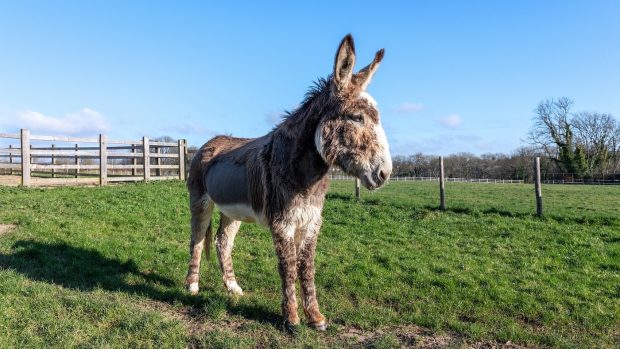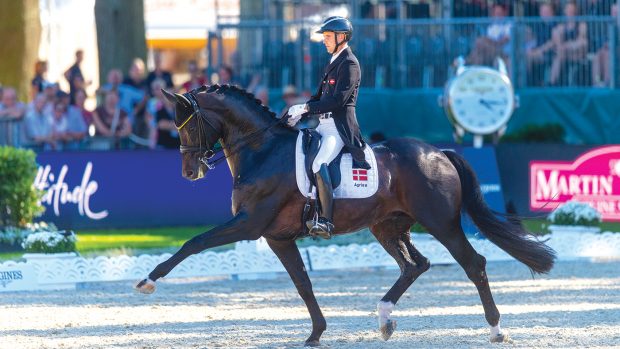Being a horse owner is an emotional rollercoaster — and never more so than when you’re faced with a bout of colic. Here the British Horse Society (BHS) and The University of Nottingham give their expert advice about what to do while you wait for the vet…
Create a safe area
- If your horse is in severe pain (i.e. trying to get down and roll) it is advisable to put them in a safe area such as a well bedded stable or in an arena (with a lunge line to be able to keep control of them) to help decrease the risk of injury.
- Take out any buckets or any other objects the horse may injure themselves on in the stable and leave them quietly until your vet arrives and can give them a sedative/painkiller. Allowing the horse to lie down and/or roll does not make colic worse or cause a twisted gut.
- Although it can be distressing to witness the horse in significant pain, it is strongly advised that the handler does not re-enter the stable without veterinary support to help prevent a potentially serious accident to the handler.
- If the horse is taken into the arena the handler should not allow the horse to go loose. For safety, the handler should wear a hat and gloves. A horse in significant pain will not be conscious of its surroundings, and therefore you should take all measures to ensure your safety.
Exercise
- If your horse is in significant pain, gentle walking for 15-20 minutes can help and is unlikely to do any harm.
- However horses must not be exercised at a trot or canter and should not be walked around for longer periods of time unless under the supervision of your vet.
- There are specific conditions/circumstances when your vet may recommend other exercise. This should only be done following diagnosis and under supervision from your veterinary surgeon, as any exercise beyond gentle walking is not recommended for most conditions.
- Do not force the horse to walk around if they are trying to go down.
- Exercising a horse that is sick will just exhaust them and if they have a serious form of colic that requires surgery, this will not help their recovery from anaesthesia.
Feed and water
- If in any doubt, ask your veterinary surgeon.
- Remove any feed from the stable. Horses that are not in violent pain and are standing calmly in the stable can have water left with them; although a sick horse is unlikely to drink.
Practicalities
- Provide your vet with good directions to your stables and a contact phone number.
- If it is likely to be difficult for the vet to find your horse, get someone to stand by the roadside near a defined landmark to help direct them to the stables/field.
- Check that you have a plan in place for transport in case your vet decides that your horse needs to be assessed at a clinic. If your horse is in a lot of pain or sick, any delay can be crucial so don’t leave this until the last minute.
- Check that the trailer/horsebox does not have any flat tyres and that the horsebox will actually start. From a referral centre point of view, difficulties with transport is a frequent cause of delays, which can be really critical in saving the life of a horse with severe colic.
- If your horse is insured, check whether they are covered for colic (this can cause delays if your vet wishes to send them into a clinic for further assessment and appropriate treatment). You should also check the amount of cover so that you can make informed decisions about treatment if your vet recommends referral.
Like this? You might also enjoy reading these:
‘Dopey cobs on the A1’ — and other things that shouldn’t happen to a vet
Sarcoids in horses: what every horse owner needs to know
Subscribe to Horse & Hound this spring for great savings
If your vet advises that your horse should be assessed at a clinic…
- Discuss the potential costs (at this stage only a rough guide can be provided) and whether a deposit is needed. Costs will vary slightly between clinics, but your vet and the clinic will be able to provide you with more specific estimates and some idea of likely complications and chances of survival.
- If you are insured, inform your insurance company that the horse is suffering from colic and has been referred.
- Check that you have good directions and the telephone number of the clinic and keep them updated if there are any problems or delays during the journey. It is important to get to the clinic as soon and as safely as possible of likely complications and chances of survival.
For more information visit www.bhs.org/colic
For all the latest equestrian news and reports, don’t miss Horse & Hound magazine, out every Thursday, plus don’t miss the latest issue, out today (18 April 2019), for our vet special




